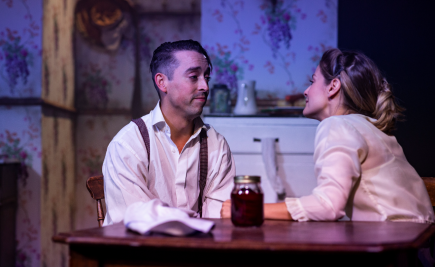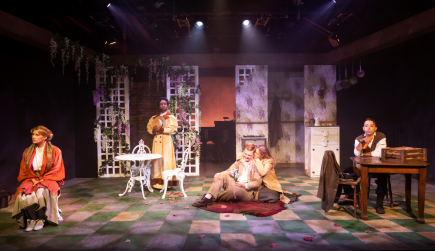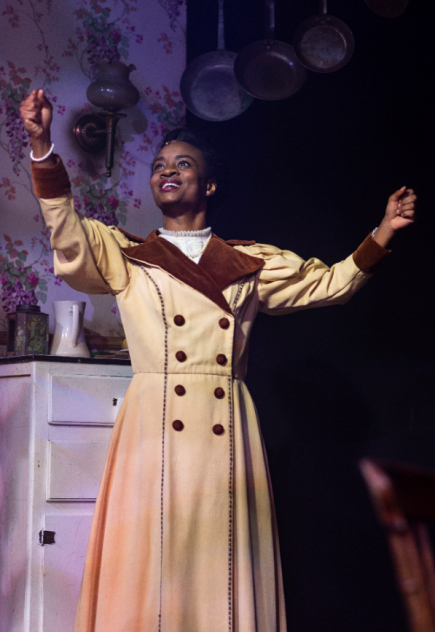The Return of the Soldier is compelling proof that, as the centennial anniversaries of the First World War draw to a close, there are still new stories and new perspectives of the Great War to be found.
Well, perhaps new stories isn’t right.
Rebecca West’s book was published a century ago, but its relatively unique exploration of the effects of a soldier’s amnesia on himself, his wife, his cousin, and his former lover – not to mention her husband – is done great justice by this polished production showing at Hope Mill Theatre.
Chris Jenkins’ portrayal of a man who is at once stoic, powerful, and immensely vulnerable is excellent as Christopher Baldry, the returning soldier, moves between bumbling incredulity to terrified misunderstanding at the events unfolding around him.
His ebbing chemistry with Tessa Kadler and Naomi Sights as wife Kitty Baldry and former lover Margaret Grey respectively is compelling, leaving the audience constantly re-evaluating the characters and their complicated relationships.
 POWERFUL: Marc Pickering steals the show as William Grey
POWERFUL: Marc Pickering steals the show as William Grey
The songs are delivered superbly and never feel unnatural, though the writing occasionally seems a little cloying.
Sights’ opening song, an expositional tale of lost love, is moving enough without the now married Grey physically cutting onions at the kitchen table.
Similarly, one can hardly help but feel touched by Kadler’s own big number in Act Two, but the metaphor it rests on – “I’m living around my husband in some… no man’s land” – is far from subtle.
But bringing the show together is the exceptional Marc Pickering, whose contrasting depictions of Margaret’s husband William and the psychiatrist Dr Gilbert Anderson have the audience unsure whether to laugh or cry.
There is a warm familiarity in his jovial depiction of Mr Grey, a mixture of silliness and softness and a dash of physical comedy which evokes feelings of the music hall.
 ATTRACTIVE: The set is eye-catching without becoming obstrusive
ATTRACTIVE: The set is eye-catching without becoming obstrusive
His Dr Anderson is as beguiling and sinister as his Mr Grey is adorable, though the psychiatrist does undergo a late redemption as he considers the morality of his work returning soldiers to the front.
His diagnosis of the damaged Christopher ‘dabbing on happiness each morning like cologne’ is the best line of the show, clashing with Kitty on the subject of mental health and her assertion that it is “time he pulled himself together… to put a little more effort in”.
These contrasting viewpoints on the increasingly relevant topic of mental health add modern-day interest with the psychiatrist claiming that one day, mental illness would be taken appropriately seriously; a day which some would argue is still yet to come.
 ABSORBING: The action makes for unusual viewing ahead of Armistice Day
ABSORBING: The action makes for unusual viewing ahead of Armistice Day
If there is one disappointment in the production, it is the treatment of Esme Sears’ Jenny Baldry, cousin of Christopher.
There is little wrong in the performance. Indeed, Sears’ remarkably expressive manner contributes to a good showing and draws sympathy from the audience.
But Jenny seems caught somewhere between narrator and character, there largely to react to the goings on around her without being properly developed herself.
When she is thrust into the limelight in Act Two, it is all too brief and seems rather shoehorned in. It is a vaguely unsatisfying use of a clearly talented actress.
On the whole, though, the production is a good one. The intimate surroundings at the Hope Mill Theatre serve the small-scale, personal nature of the story well, and the set is attractive without being obtrusive.
With less than two months until the anniversary of Armistice Day, it makes for absorbing and unusual viewing. To capture such a refreshing take on the war after four years of commemoration on stage and screen is quite an achievement – see it while you can.
*The Return of the Soldier is playing at Hope Mill Theatre, Manchester until Saturday, September 29. You can buy tickets HERE.



